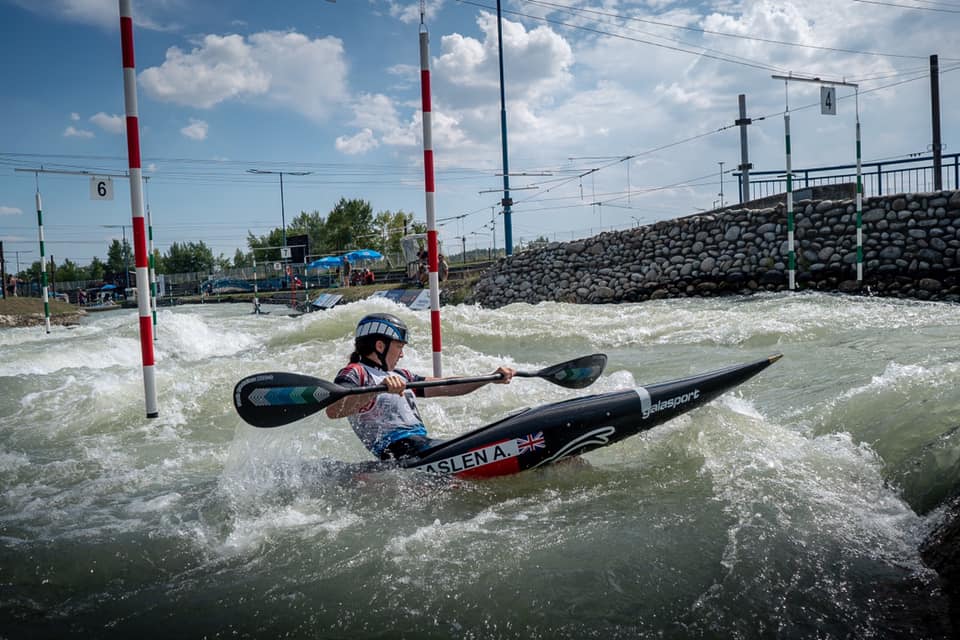There are literally thousands of hours of expertise backing up hundreds of different theories around canoe slalom. In recent years the sport has gotten faster, with running times becoming shorter and the courses more technical. We are also seeng massive developments in equipment facilitating these technical advances. Such as boats becoming more manoeuvrable, and our buoyancy aid/top being altered to be thinner for more range around poles. Whitewater is volatile; usually the courses we use are artificially ‘pumped’, which means there is a consistent volume of water coming down the course at any time. However depending on the character of the river bed, this can flush. That means the water gathers in pockets to full capacity and flushes out at certain parts of the course. It means that features like drops, and stoppers, can become inconsistent and change during the course of a race run. Canoe slalom athletes train every day to get better at reading and understanding the water, but on the race day it’s impossible to predict exactly how a certain bit of water will feel.
When I started racing, a huge emphasis was placed on how ‘difficult’ the mental side of preparation is. It was really popular at the time to apply well-known sports psychology structures to training and racing without properly understanding them. That’s not meant to undermine the way these structures are put together. It’s more like I believe someone can fully understand the theoretical side of a concept, but not be able to implement it practically. For example, a really popular programme to use at one point was the structure behind The Chimp Paradox. It’s a well written book, and it paints strong imagery around the scientific reasons our brains behave a certain way. Everyone is completely different, and with that in mind the Chimp method really over complicates things for me. I’d say the same for the ‘process focused rather than outcome focused approach’. I’m just using these as examples of the hundreds of different mental approaches, and this book certainly isn’t meant to criticise any of them. Way better athletes than me use all of them.
For me, a big step in focussing on the start line was accepting the feelings I get before a race. Your comfort zone is likely to be a situation you know very well and where you can predict what’s going to happen next. Racing in slalom is distinctly out of that comfort zone. Accepting that, and anticipating the emotions I’m likely to feel during the build up to a race, made it much easier for me to let go of them on the start line. It’s so incredibly easy to find a structure that makes your brain feel nice and comfortable, and desperately hang on to it throughout a race. I’ve found that doesn’t really work, because you end up thinking about that structure instead of concentrating on the job at hand.
In the days before a race, athletes are able to train on the whitewater in designated sessions. When the race course is set, you are no longer able to paddle on the course before your run. So a priority for the training sessions is to learn as much as possible about the course, and practise as many ‘moves’ on the features as possible. I get a lot of anxiety around this stage; I feel responsible for finding every possible move that might be in the race. This can be pretty stressful in busy sessions. Quite often the gates aren’t exactly where you’d like them to be, or you can quickly feel as though you’re missing out on certain moves if they are repeatedly not included in team sessions. Trusting in your own ability here becomes key; even if I haven’t tried a move before, there’s every chance with my own experience that I’d be able to do it without thinking in a race. So instead of concentrating on getting as many courses in the bag as possible, I try and relax, to focus on what the water is doing rather than the gates. If I have a good understanding of how that section feels, I should be able to choose what happens to my boat in any situation. I guess it’s the slalom equivalent of finding a master key; if you relax and feel the water, it fits everything.
I get quite nervous before races; I’m getting pretty good at anticipating what sets off nerves. It’s fairly guaranteed that I’ll get the ‘stomach swooping’ the first time I look at the gates set out for the race course. The thing is, because our whole year of training leads up to these races, it can quickly end up feeling as though emotions and senses are sharpened and way more sensitive when it gets to actual crunch time. Which can be great; if your awareness and reactions are heightened then you can definitely benefit from them in a race run. What’s not great is if that higher sensitivity makes you neurotic in the lead up to a race. It sounds stupid, but things like noises when I’m sleeping, efficiency in transport, coaching input during sessions and the food leading up to a race can easily become areas of anxiety and stress if you let yourself become too sensitive to them. It’s really amazing the conditions under which a person can race their best. Franz Anton won gold at the world championships in 2018 after a week of being sick. I know countless athletes who are unable to sleep at all the night before a race. You can lose a boat and have to borrow equipment and still perform at the highest level. That’s not to say you shouldn’t try and make your environment absolutely ideal for yourself. It just means I think that you shouldn’t put any weight on things you can’t control.

 RSS Feed
RSS Feed
